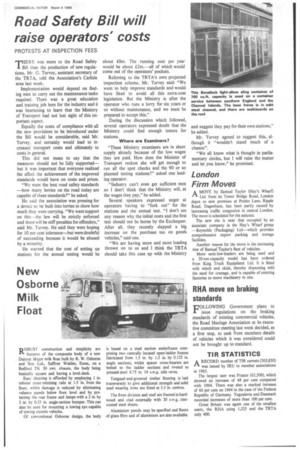Road Safety Bill will raise operators' costs
Page 51

If you've noticed an error in this article please click here to report it so we can fix it.
PROTESTS AT INSPECTION FEES THERE was more to the Road Safety Bill than the production of new regulations, Mr. G. Turvey, assistant secretary of the TRTA, told the Association's Carlisle area last week.
Implementation would depend on finding men to carry out the maintenance tasks required. There was a great education and training job here for the industry and it was heartening to learn that the Ministry of Transport had not lost sight of this important aspect.
Equally the costs of compliance with all the new provisions to be introduced under the Bill would be considerable, said Mr. Turvey, and certainly would lead to increased transport costs and ultimately to costs in general.
This did not mean to say that the measures should not be fully supported— but it was important that everyone realized the effect the achievement of the improved standards would have on costs and prices.
"We want the best road safety standards —how many lorries on the road today are capable of these standards?" he asked.
He said the association was pressing for a device to be built into lorries to show how much they were carrying. "We want support
on this the law will be strictly enforced and there will be stiff penalties for offenders," said Mr. Turvey. He said they were hoping for 10 per cent tolerance—but were doubtful of succeeding because it would be abused by a minority.
He warned that the cost of setting up stations for the annual testing would be about £8m, The running cost per year would be about of which would come out of the operators' pockets.
Referring to the TRTA's own projected inspection scheme, Mr. Turvey said: "We want to help improve standards and would have liked to avoid all this extra-cost legislation. But the Ministry is after the operator who runs a lorry for six years or so without maintenance, and we must be prepared to accept this."
During the discussion which followed, several operators expressed doubt that the Ministry could find enough testers for stations.
Where are Examiners?
"These Ministry examiners are in short supply already because of the low wages they are paid. How does the Minister of Transport reckon she will get enough to run all the spot checks and the 90 or so planned testing stations?" asked one leading operator.
"Industry can't even get sufficient men so I don't think that the Ministry will, at the wages they pay," he added.
Several speakers expressed anger at operators having to "fork out" for the stations and the annual test. "I don't see any reason why the initial costs and the first test should not be borne by the Exchequer. After all, they recently slapped a big increase on the purchase tax on goods vehicles," said one. •
"We are having more and more loading thrown on to us and I think the TRTA should take this case up with the Ministry
and suggest they pay for their own stations," he added.
Mr. Turvey agreed to suggest this, although it "wouldn't stand much of a chance".
"We all know what is thought in parliamentary circles, but I will raise the matter and let you know," he promised.
























































































































































